Introduction
The relationship between social media and SEO represents one of the most misunderstood yet powerful dynamics in modern digital marketing strategy. While social media platforms don't directly influence search engine rankings through traditional backlinks, they create a complex web of indirect effects that significantly impact your website's visibility and organic growth. Understanding this hidden connection allows marketers to leverage social platforms strategically, amplifying their content's reach and generating measurable improvements in search performance. This comprehensive guide explains how social signals in SEO work, the mechanisms behind social-driven organic growth, and actionable strategies to harness this relationship effectively.
Understanding the Core Relationship Between Social Media and SEO
Social media and SEO function as complementary forces within your digital marketing ecosystem. Search engines like Google have consistently stated that social signals—such as likes, shares, and comments—are not direct ranking factors. However, this technical distinction masks the substantial indirect influence social media exerts on search performance.
When your content gains traction on social platforms, it triggers a cascade of events that search engines recognize and reward. Increased visibility leads to more website visits, longer engagement times, and higher likelihood of earning genuine backlinks from authoritative sources. These metrics directly influence how search engines evaluate your site's relevance and authority.
The Indirect Pathway to Rankings
Think of social media as an amplification system for your content. When you publish a valuable article or resource, social sharing extends its reach exponentially beyond your immediate audience. This expanded visibility increases the probability that:
- Industry influencers discover and reference your content
- Journalists find material worth citing in their publications
- Bloggers link to your resources in their articles
- Website owners bookmark and reference your information
Each of these outcomes contributes to factors that search engines measure when determining rankings.
How Social Signals in SEO Generate Measurable Impact
Social signals in SEO encompass all interactions your content receives on social platforms. While these signals don't directly manipulate search algorithms, they create conditions that boost website ranking through several validated mechanisms.
Content Discovery and Indexing Speed
Search engines crawl popular social platforms continuously. When your content appears on these channels, search engine bots often discover and index it faster than they would through traditional crawling. This rapid indexing provides a competitive advantage, especially for time-sensitive content or breaking news topics.
Brand Search Volume Increases
Consistent social media presence builds brand awareness. As more people encounter your brand on social platforms, they're more likely to search for your company name directly on Google. This increase in branded search queries sends powerful trust signals to search engines, indicating that your brand has genuine recognition and authority in your field.
Extended Content Lifespan
Quality content shared on social media enjoys multiple cycles of visibility. A single piece can resurface weeks or months after publication as different users discover and reshare it. This extended lifespan increases cumulative traffic and the ongoing potential for earning valuable backlinks.
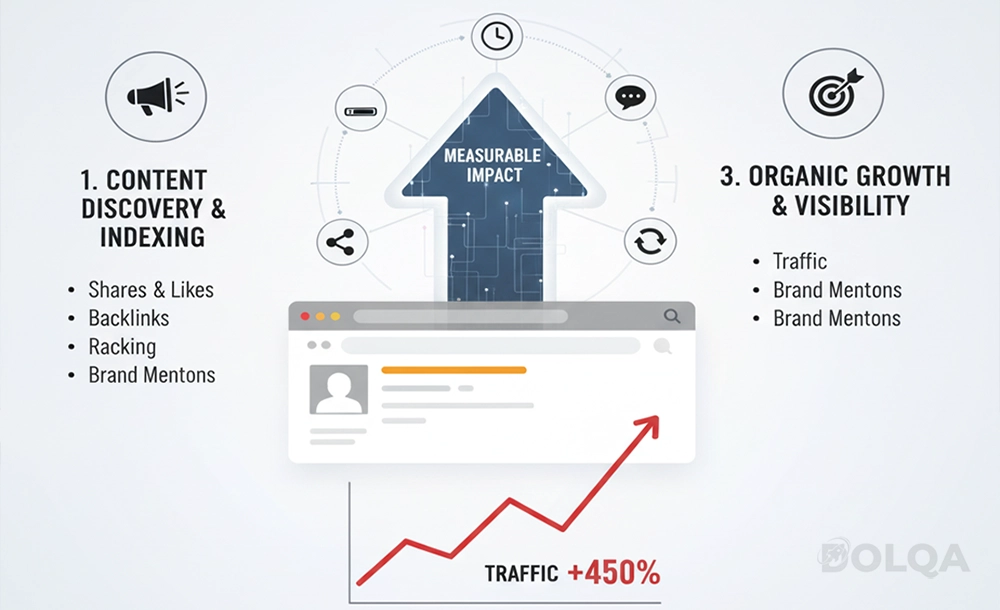
Content Sharing and Backlinks: The Critical Connection
The relationship between content sharing and backlinks represents the most tangible way social media influences SEO performance. Here's how this process unfolds:
The Amplification Cycle:
- Initial Publication - You publish valuable content on your website
- Social Distribution - You share content across your social channels
- Audience Engagement - Followers interact with and reshare your content
- Extended Reach - Content reaches audiences beyond your immediate network
- Discovery by Influencers - Industry authorities encounter your material
- Natural Link Building - Impressed readers reference and link to your content
- Authority Growth - Accumulated backlinks improve domain authority
- Ranking Improvements - Enhanced authority translates to better search positions
Quality Over Quantity in Social Sharing
Not all social shares contribute equally to SEO benefits. A single share by an industry influencer with engaged followers often generates more meaningful results than thousands of automated or bot-driven shares. Focus on building genuine relationships with active community members who appreciate and amplify quality content.
Building an Integrated Digital Marketing Strategy
To maximize the synergy between social media and SEO, develop a cohesive digital marketing strategy that treats these channels as interconnected rather than separate.
Strategic Content Planning
Create shareable content formats:
- In-depth guides that solve specific problems
- Original research and data-driven insights
- Visual content like infographics and videos
- Controversial or thought-provoking perspectives
- Practical tutorials and how-to resources
Optimization Techniques for Both Channels
Essential elements to include:
- Compelling headlines that work on both search results and social feeds
- Rich media elements that increase engagement rates
- Clear calls-to-action appropriate to each platform
- Mobile-optimized formatting for seamless user experience
- Schema markup that enhances search result displays
Platform-Specific Considerations
Different social platforms serve distinct purposes in your SEO ecosystem:
- LinkedIn - Ideal for B2B content and professional thought leadership that attracts industry backlinks
- Twitter - Excellent for real-time engagement and content distribution to journalists and influencers
- Facebook - Effective for community building and content with broad appeal
- Instagram - Visual storytelling that builds brand recognition
- Pinterest - Long-term traffic generation for evergreen visual content
- YouTube - Video content that ranks in both YouTube and Google search results
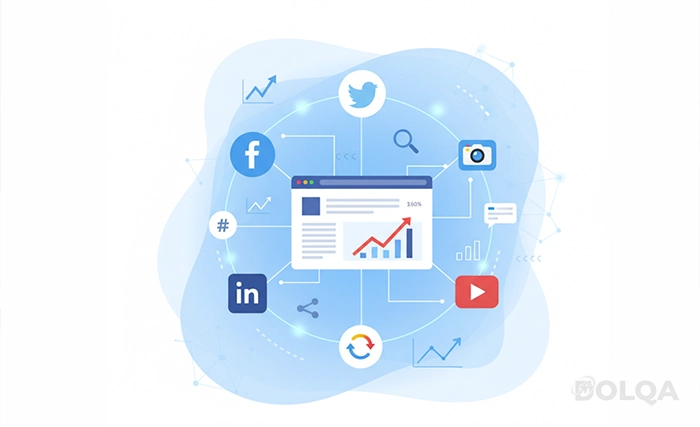
Measuring Social Media's SEO Impact
Tracking the relationship between social activity and SEO performance requires monitoring specific metrics:
Key Performance Indicators:
- Referral Traffic - Monitor social media-driven website visits in Google Analytics
- Backlink Acquisition Rate - Track new backlinks and their sources using tools like Ahrefs or Moz
- Brand Search Volume - Measure branded keyword searches through Google Search Console
- Engagement Metrics - Analyze bounce rate and time-on-site for social traffic
- Content Indexing Speed - Note how quickly new content appears in search results
- Domain Authority Changes - Track authority metrics over time as social presence grows
- Keyword Rankings - Monitor position changes for target keywords
Actionable Strategies to Boost Website Ranking Through Social Media
Implementation Steps:
- Develop a Content Calendar - Plan content that serves both SEO and social objectives simultaneously
- Engage Authentically - Build real relationships within your industry community rather than broadcasting promotions
- Optimize Social Profiles - Ensure profiles are complete with links to your website and consistent branding
- Encourage Employee Advocacy - Empower team members to share company content, multiplying reach
- Use Rich Snippets - Implement structured data markup to enhance how content displays when shared
- Monitor Trends - Stay current with industry conversations to contribute timely, relevant content
- Repurpose Content - Adapt core content into multiple formats suitable for different platforms
- Build Influencer Relationships - Connect with industry leaders who can amplify your content's reach
Common Misconceptions and Pitfalls to Avoid
Myth: More followers automatically mean better rankingsReality: Engaged, relevant audiences matter more than follower counts.
Myth: Buying social shares will boost SEOReality: Artificial engagement often harms credibility and provides no lasting benefits.
Myth: Social media can replace traditional SEO effortsReality: These strategies work best when integrated, not substituted.
Myth: You need presence on every platformReality: Focus on platforms where your target audience actively engages.
Conclusion
The hidden connection between social media and SEO creates powerful opportunities for businesses willing to invest in authentic, strategic digital marketing. While social signals don't directly manipulate search algorithms, they generate a compound effect through increased visibility, faster content discovery, brand awareness growth, and natural backlink acquisition. Success requires viewing social media not as a separate marketing silo but as an integral component of your overall SEO strategy.
By creating valuable content, fostering genuine community engagement, and maintaining consistent cross-channel presence, you'll activate the full potential of this relationship. The result isn't just improved rankings—it's sustainable organic growth built on authentic authority and meaningful audience connections.
Start implementing these strategies today, and remember that the most powerful results emerge from patience, consistency, and genuine value creation across all your digital channels.


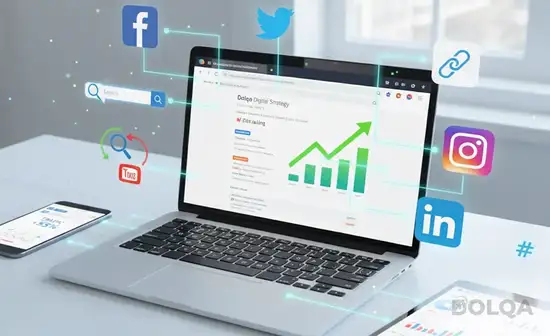

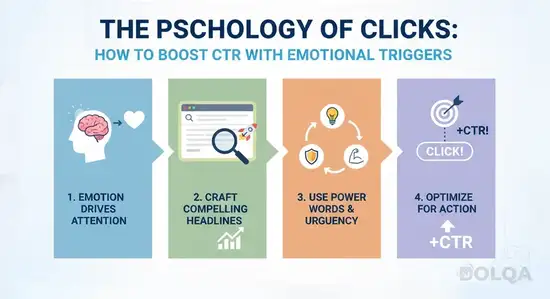

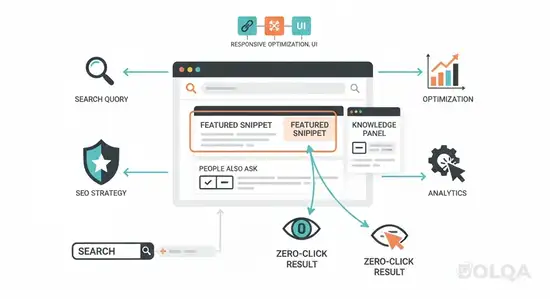
Comments (0)
Leave a Comment
No comments yet. Be the first to comment!